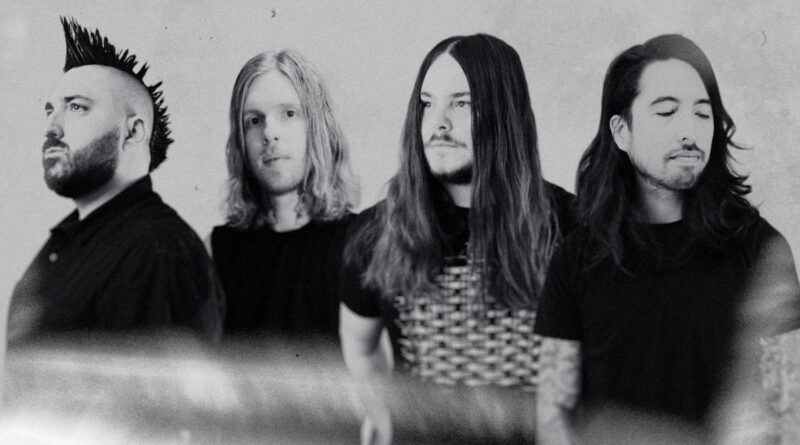Of Mice & Men: Our Shattered Hearts Rearranged
The relief of pressure is satisfying. Pimples popping. The draining sensation of a headache dissipating. When you wake after a distressing mental health episode to a stillness of the mind. Pain needs to be experienced before understated pleasure. OF MICE & MEN pick at the emotional scab with their seventh studio album Echo. On a Friday evening, we brewed coffee with vocalist Aaron Pauley and poked around in our pain.
Echo emerged in chapters throughout 2021. February brought us Timeless. Bloom flowered in May. The last instalment, Ad Infinitum was released in conjunction with the full-length on December 3rd. A convoluted move but deliberate. While OF MICE & MEN could flex the superficial “because we want to”, the reasoning runs a lot deeper as it splits into two.
“We live in an age where people make all sorts of playlists,” Aaron comments. The way we consume music has evolved over the course of time. Listening to an album front-to-back is worn as a badge of honour. As if it’s peculiar. Spotify and other streaming platforms make for faster access to the bands we love. “People used to have to go to record stores and buy vinyl and put it on their record player to listen to it. Now you can create something, register it in ASCAP or BMI, or whatever your publishing is, and then upload it and it can be out within a couple days.” the vocalist explains.
In terms of albums, streaming also means we don’t have to skip through filler to get to killer. The full album experience becomes lost. Does this mean the artform of the album is dying out? Not necessarily as Aaron is keen to demonstrate. “We will probably always be releasing music, whether or not even the music ends up on an album” he starts. “I would like to get to a point where we’re creating EPs and dropping music while also working on an album.” When we ask whether that approach would ever replace the long form for OF MICE & MEN, Aaron tells us; “There will always be that demographic, that need. Sort of like how television didn’t replace movies but offered something that’s in a smaller format that happens more frequently.”
Smaller formats see OF MICE & MEN using the technological shift in society to their advantage. In making their material more accessible to their fans, they also want to mend the humanitarian disconnect technology has served. “Music is a language, it’s the way we communicate.” Aaron explains. “We thought it would be awesome to release EPs, because you’re having episodic conversations rather than a Netflix dump that gives you all 13 episodes at once.” As we look back over the staggered roll out, the episodes tie together into a binge-worthy series of grief. In turn, these water-cooler conversations between music fans allow much deeper topics to seep in.
Society at large experienced isolation and disconnect when the world ground to a halt two years ago. Sessions in a back garden were replaced by Zoom calls. Analogue laughter became a digital ping and a small expulsion of air. Our friends pixelated. As a species which needs physicality in order to function, the human condition deteriorated as depression and anxiety increased. Rather than talking through the emotions, we withdrew into ourselves – let them fester. “It’s easy to sweep not being 100% okay under the rug” Aaron says. A lot of us favoured façade over authenticity. This façade cannot be carried into music. The art supersedes the fear of vulnerability.
“I found that music forces you to be honest. That’s gonna resonate with people.” Aaron muses. One thing Echo does is resonate. Loss is an inevitability. People, pets, possessions, we even lose parts of ourselves as we move through life. The grief it breeds isn’t easy to navigate. We never feel one emotion at a time regardless of whether they can be boiled down to a core feeling. So how can we be expected to talk about something we can’t grasp? Wrapping themselves in nautical, floral, and aquatic imagery is OF MICE & MEN’s way of understanding the incomprehensible. “Relating to losing a loved one or experiencing losing somebody to either illness or age…” Aaron pauses for a moment as if bolstering himself to confront reality. “Comparing that to watching a flower losing its petals encapsulates that experience and emotion more than I think I could explain how it feels to be there for somebody as they’re dying.”
It’s this emotional honesty which can rebuild the connection we sorely lack. While it’s indirect and dressed in the finest allegories, the bitter truth tastes better than the sweet lie. It isn’t only the listeners who confront their truest selves within this album. Aaron does also. “Sometimes I’ll write a song – I’ll read it back not realise what I was writing about until I sort of dissect it and think about how it applies to me in my life.” Aaron tells us with a sip of coffee. “Then it makes sense – what I was going through and trying to get out.”
Time slips away as Aaron leads us into the emotional labyrinth of loss. The richest display of imagery is something which won’t impact the listener until long after album’s close. “The rain touches everything I love until it’s all washed away” Levee has us screaming. Those fine showers which soak us through before we’re aware it’s raining is the steady erosion of everything we hold dear. “The rain is banal and unsuspecting. I’m not talking about tidal waves or hurricanes, but gentle rain.” Aaron explains. “Loss is prevalent and touches everything until it’s your time.”
Echo is out now via SharpTone Records.
Like OF MICE & MEN on Facebook.

